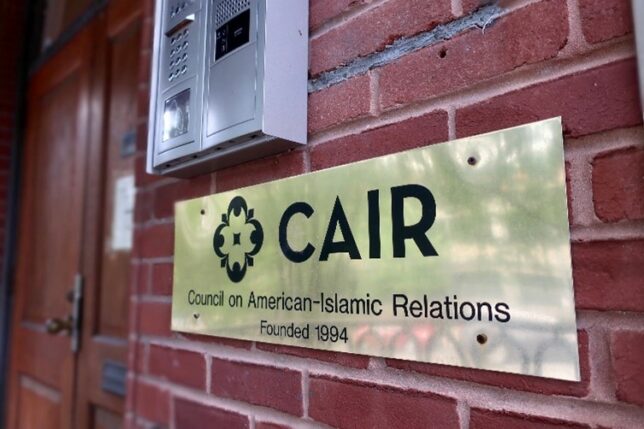Organization Trends
Hamas’s American Allies: Other American Islamist Endorsers


Hamas’s American Allies (full series)
The U.S. Brotherhood Network | Other American Islamist Endorsers
Far-Left Supporters | Far-Right Supporters
Other American Islamist Endorsers of Hamas
The U.S. Council of Muslim Organizations (USCMO), the biggest Muslim American coalition in existence, implicitly justified the Hamas attacks in its press release. It continued the pattern of omitting any mention of Hamas to dodge the thorny issue of whether it supports the terrorist group.
The USCMO called the Israeli strikes on Gaza “unprovoked,” as if Hamas’ attacks didn’t happen at all. It indirectly frames them as legitimate resistance, saying Israel’s actions “oblige them [Palestinians] to be in constant self-defense.”
There is no sign of dissent from the organizations represented by USCMO. Focus on Western Islamism contacted its eight founding members, as well several council members, about the press release and received no response from any of them.
One of USCMO’s members—and one of the largest Muslim American organizations—is the Islamic Circle of North America (ICNA), an offshoot of a Southeast Asian Islamist group called Jamaat-e-Islami, described by the Investigative Project on Terrorism as an “ideological cousin” of the Muslim Brotherhood.
ICNA, like the others, solely blamed Israel for the violence and did not mention Hamas or its terrorist attacks. Its declaration promoted the pro-Hamas AMP’s advocacy day on Capitol Hill.
ICNA denies supporting terrorism or any violent organizations. Its website condemns al-Qaeda, ISIS, and Boko Haram. Tellingly absent from that list is any terrorist organization focused on attacking Israel.
ICNA published a member’s handbook in 2010 that vividly exposed its extremism. It repeatedly quotes the founder of the Brotherhood and states that Muslims are required to support violent jihad against occupiers of Muslim land and work toward the creation of theocratic Sharia-based governments.
ICNA emphasized the use of secrecy and deception to pursue these goals. “This does not mean, however, that the Islamic Movement should reveal all its strategies, plans, and organization, because this would be foolhardy and put the movement and its members in danger. The slogan should be, ‘Work in public but organize in secret,’” it states.
After the handbook was exposed by those ICNA slanders as “Islamophobes,” ICNA’s website stated that it had updated its curriculum and removed the material in question. It did not, however, repudiate any of the content.
Omar Suleiman, one of the top imams in the country and president of the Texas-based Yaqeen Institute for Islamic Research, continued the pattern of omitting any mention of Hamas. He is also the resident scholar of Valley Ranch Islamic Center in Texas and works for Southern Methodist University as an adjunct professor and member of its Ethics Center Advisory Board.
In his article he indirectly legitimizes Hamas’ attacks by referring to “the current escalation of Israeli aggression and Palestinian resistance.”
The Research Director of Islam and Society at Suleiman’s Yaqeen Institute, Imam Tom Facchine, preached, “We’re with the Palestinian resistance, one hundred percent. No ifs, no ands, no buts. No equivocations, no apologies, no condemnation.”
Facchine’s influence goes beyond the Yaqeen Institute. According to his bio, he is the resident scholar of a mosque in Utica, New York, as well as a former imam and chaplain of Hamilton College.
Hamas’ attacks were also explicitly endorsed by popular Muslim American author Daniel Haqiqatjou, who is also the founder of the Alasna Institute and MuslimSkeptic.com. He wrote, “The recent actions by Hamas are not acts of terrorism; they are acts of resistance.”
The Assembly of Muslim Jurists of America (AMJA) can be added to the list of Hamas supporters in the United States. Although it hasn’t issued any recent statements, it issued a fatwa in January 2009 that responded to a question about Hamas by saying, “Now is not the time to discuss the errors of Hamas or any other Palestinian groups.” It encouraged readers to read the Arabic version for a fuller explanation that it apparently did not want to be available in English.
One of its officials, however, was a bit more transparent in a video posted on C’s website. Waleed Basyouni, a member of its Fatwa and Research Committee, taught that Hamas is not a terrorist group. Basyouni’s bio states that he is also the vice president of the Al-Maghrib Institute, director of the Texas Dawah Convention, and a member of the North American Imam Federation.
The 2009 fatwa was authored by AMJA’s Secretary-General, Salah Al-Sawy. His bio states that he’s also president of the American Open University and the president of Mishkah University, both online Islamic schools.
The Anti-Defamation League (ADL) also documented endorsements of Hamas’s attacks from the U.S. Palestinian Community Network, the Palestinian Youth Movement, Palestine Legal, the Palestinian Assembly for Liberation, and Al-Awda.
The startling find of this research is that it was nearly impossible to find any imams, mosques or Islamic organizations that condemned Hamas’ attacks in their wake. In fact, only one imam—Rashid Jabbar from Crown Heights, New York—fully condemned Hamas and Hezbollah.
The American Islamic Forum for Democracy, a group of Muslim reformers fighting Islamism, is the only organization that clearly sided with Israel.
Among the major Muslim American organizations, only the Muslim Public Affairs Council reacted to the violence with an unequivocal statement against terrorism and violence in all forms, explicitly condemning “attacks against Israeli civilians by Hamas” and the “taking of lives by both parties.”
Based on these facts, it can only be disturbingly concluded that Hamas has a massive amount of institutional support in the Muslim American community. We do not know to what degree this translates into popular support because there is an absence of polling of Muslim American opinion on the subject.
In the next installment, Hamas can count on some far-left organizations in the U.S. to justify Hamas’s attacks.


